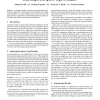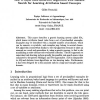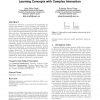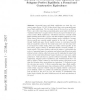1134 search results - page 19 / 227 » Sequential Inductive Learning |
120
click to vote
ICLP
1997
Springer
15 years 6 months ago
1997
Springer
We introduce novel, sound, complete, and locally optimal evaluation strategies for functional logic programming languages. Our strategies combine, in a non-trivial way, two landma...
ECAI
2004
Springer
15 years 7 months ago
2004
Springer
Abstract. Learning in complex contexts often requires pure induction to be supported by various kinds of meta-information. Providing such information is a critical, difficult and ...
144
click to vote
ECML
1993
Springer
15 years 6 months ago
1993
Springer
This paper describes a genetic learning system called SIA, which learns attributes based rules from a set of preclassified examples. Examples may be described with a variable numbe...
121
Voted
GECCO
2005
Springer
15 years 7 months ago
2005
Springer
Constructive Induction is the process of transforming the original representation of hard concepts with complex interaction into a representation that highlights regularities. Mos...
125
click to vote
CORR
2007
Springer
15 years 2 months ago
2007
Springer
Abstract. Sequential game and Nash equilibrium are basic key concepts in game theory. In 1953, Kuhn showed that every sequential game has a Nash equilibrium. The two main steps of ...




